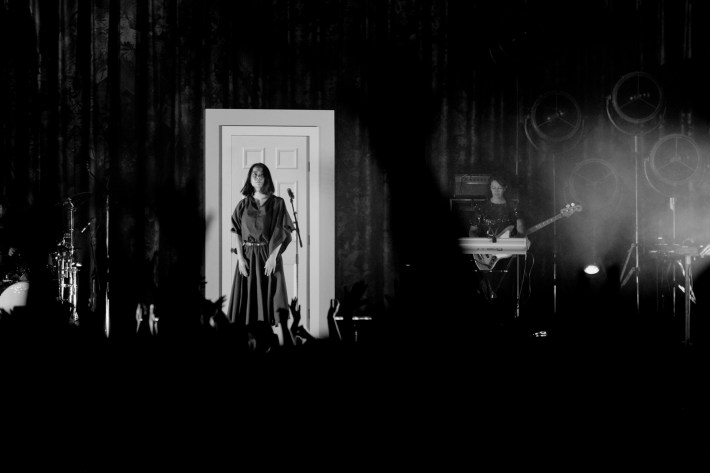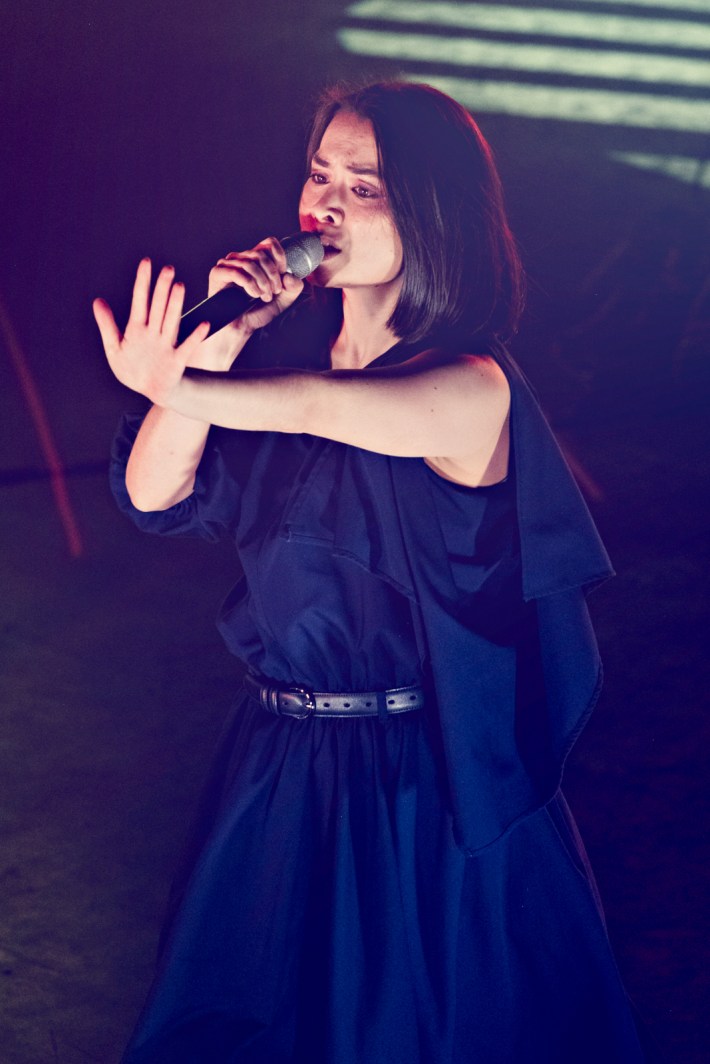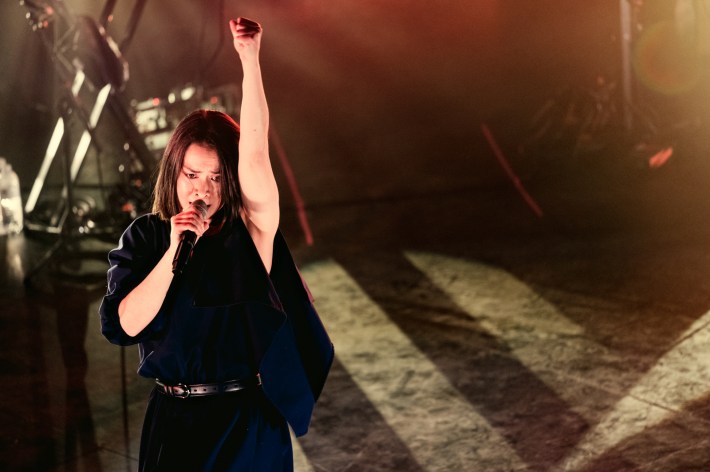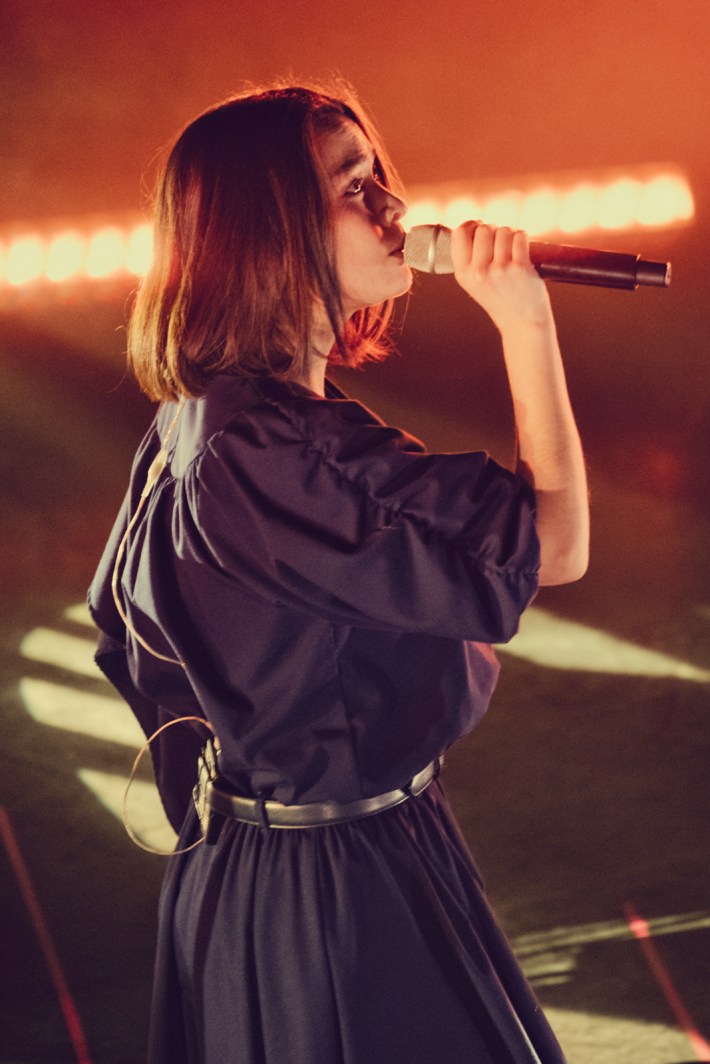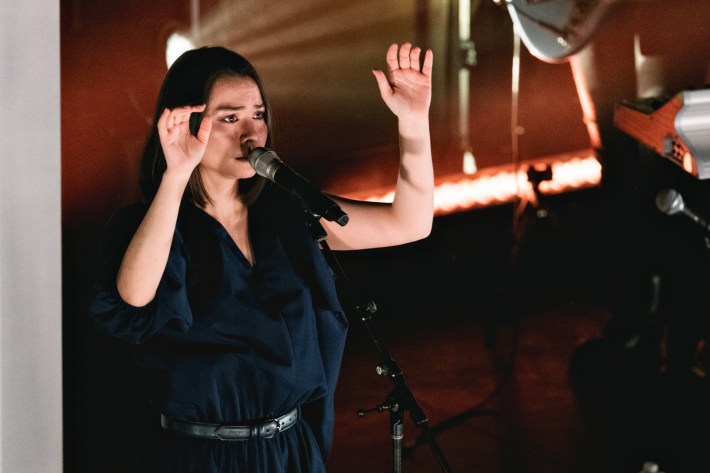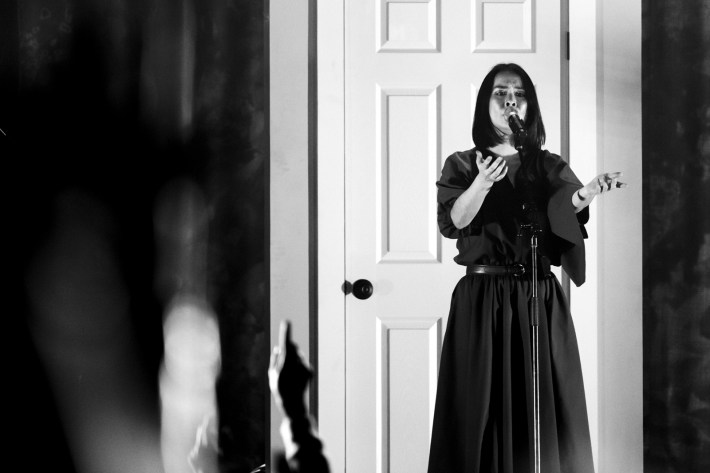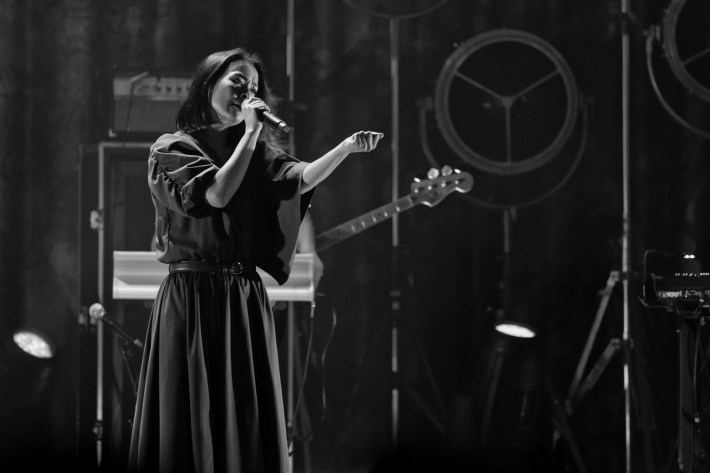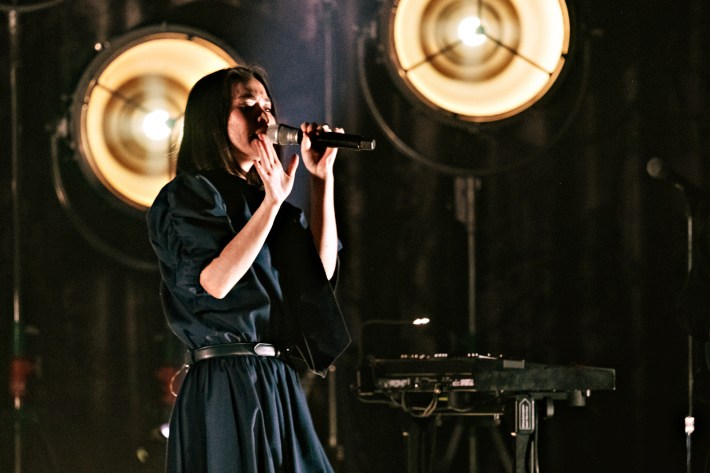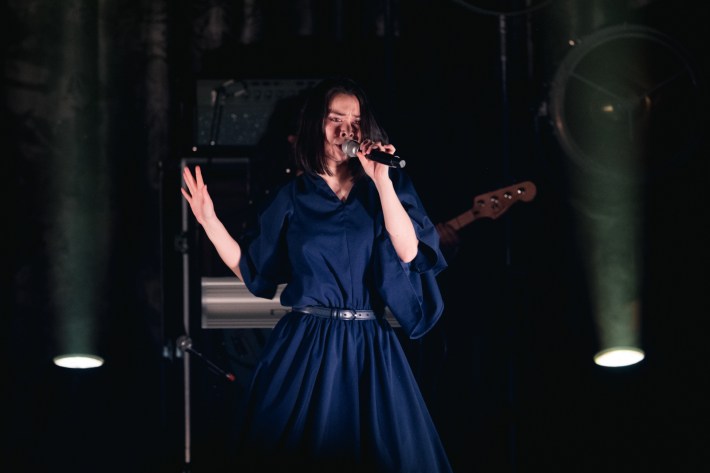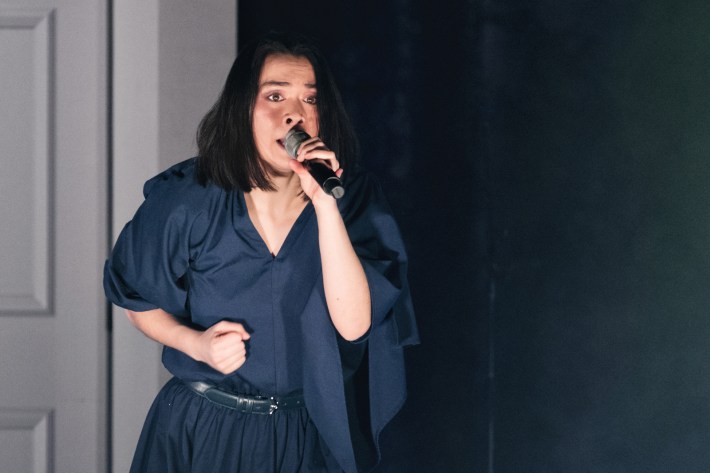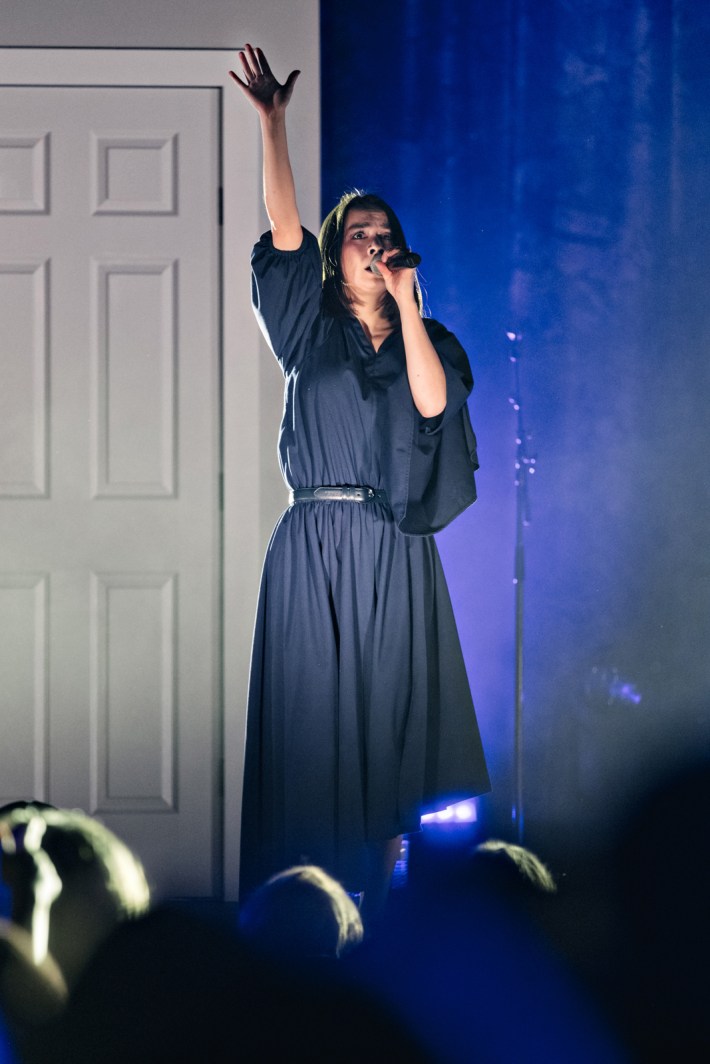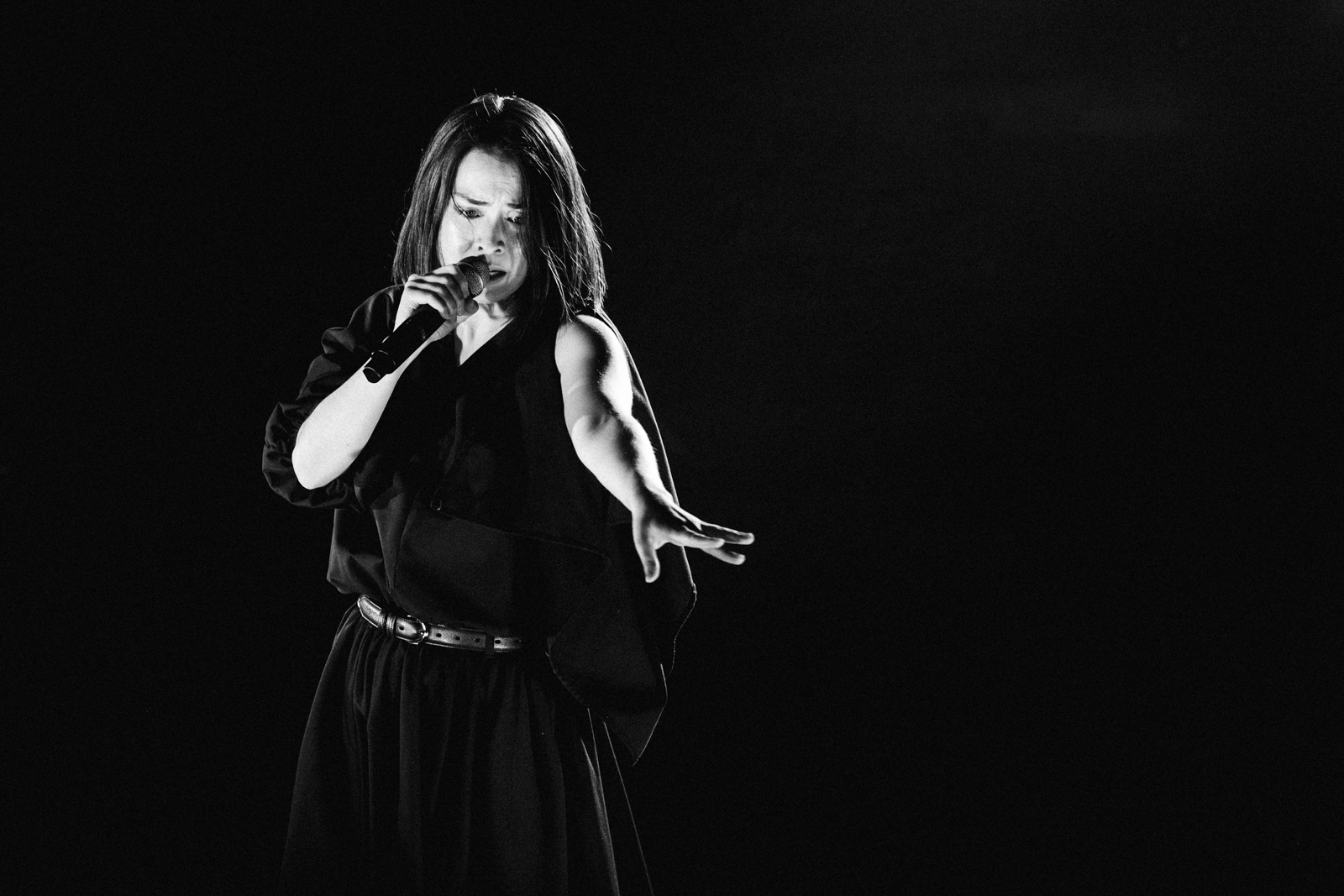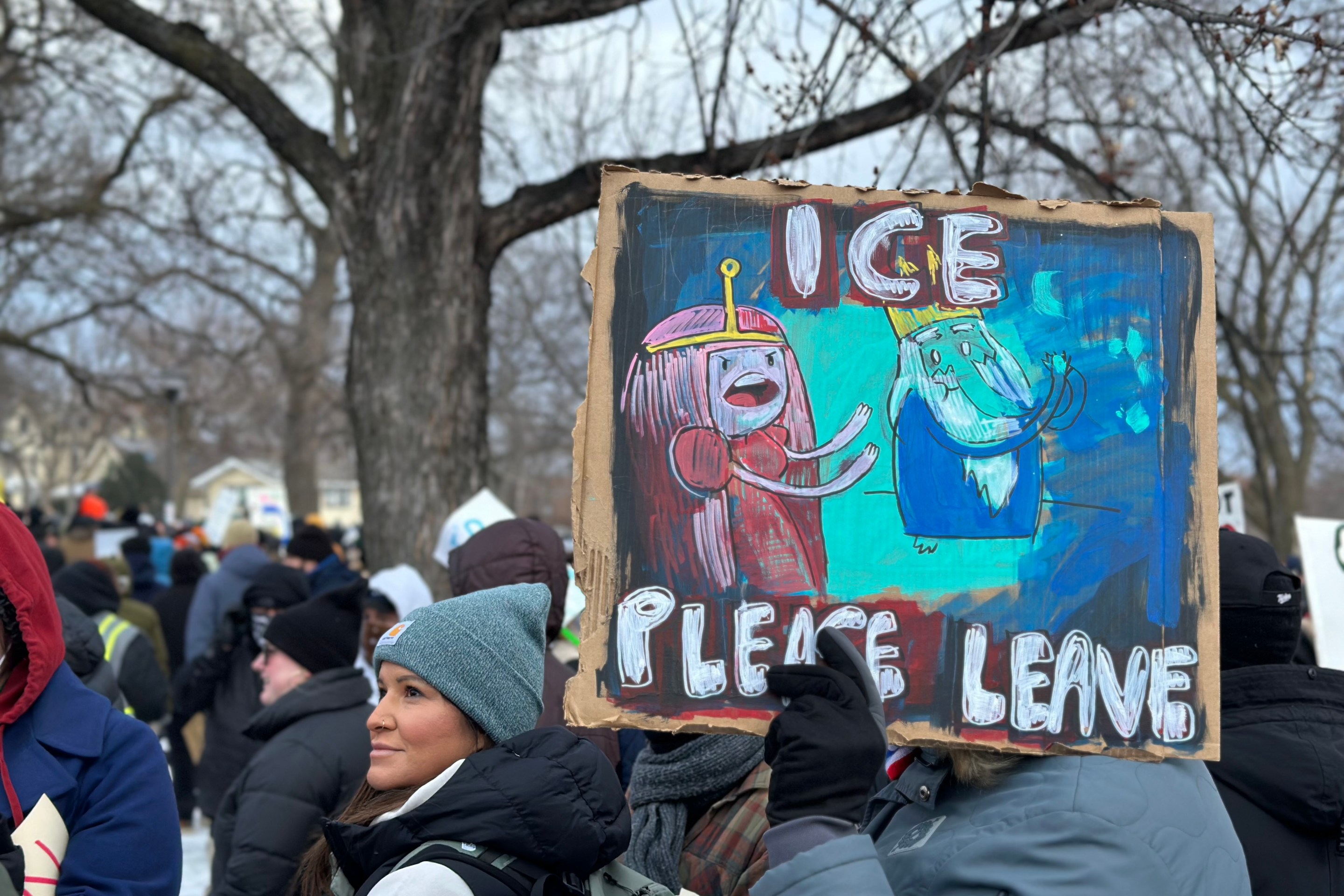If you glanced away from the stage at the Palace Theatre last night—well, you probably didn’t. Not often. Not at least if you were among the rapt Mitski superfans (and are there any other kind?) in my vicinity. But if, by unlikely chance, you did look elsewhere, momentarily, a mass scream of amazed delight would have jerked your eyes back Mitski-ward to learn what could possibly trigger all that ecstatic hubbub.
And sometimes? Not much! A gesture as simple as a raised arm, executed with deliberate casualness, might be enough, or a quick simulated one-two knock in time with the keyboard jabs of “Should’ve Been Me.” Yet it could also have been set of motions as elaborate as the flag-less semaphore routine she executed during "Nobody," blurring the line between choreographed discipline and free self-expression. Mitski Miyawaki can do what she wants onstage—a hell of a burden, when you think about it. And she is one to think about things.
Even when Mitski whirled about in her dark poufy frock, its complex sleeves conjuring a stylishly witchy ’80s bridesmaid air, she didn’t seem to seek the abandon of a Stevie Nicks or a Kate Bush. Think instead (as I admit I didn’t until she collaborated with him recently) of peak David Byrne. Though Mitski’s less willfully eccentric, she moves with that same sense of avoiding-not-defying convention. If you’re a performer for whom people will cheer, why limit your range of body motion to the expected stances?
Mitski’s sixth and latest album, Laurel Hell, has been counted as a disappointment in many places, including my apartment. Neither as playful as Be the Cowboy or as revelatory as Puberty 2 or as intimate as Bury Me at Makeout Creek, Laurel Hell is hard not to hear as an expression of Mitski’s discomfort with becoming “Mitski,” the person fans and critics and bizzers create through their response to her art. But at the Palace—and I hate to be one of those “the magic of live music!” guys—the songs grew as big as the room. Bigger even. “Love Me More” may be a desperate attempt to seek self-obliteration through overwhelming adoration, but boost those Blondie-gone-disco drums in the mix and it’s also a great set opener.
Didn’t hurt that Mitski selected her six best new songs, folding them into a well-pruned setlist that included almost as many cuts from 2014’s Makeout Creek. Some artists have a songbook they pull from—Mitski seems to accrue material, developing her setlist like a fossil record. And the oldies were bigger too. With a whomping drum intro leading to Mitski counting off “1-2-3-4” just like a regular ol’ bar-rocker, “Townie” expanded into the boy-baffled footloose rockabilly song it always wanted to be. “Geyser,” introduced with a slightly astringent synth wash on Be the Cowboy, led with an apocalyptic scronch in concert.
But new arrangements and a gutsy band weren’t all that changed these songs. So did time. Amid a pandemic, the “I just want somebody near me” of “Nobody” (a sort of “Dancing with Myself” by way of the Cardigans) just hits different, as they say. (Do they still say that? I’m old.) And Mitski’s strained relationship with her success layers yet another filter over these songs—does she really want us to love her more, after all? Last night, everyone seemed pretty cool. But online, things can get intense.
Peer at Mitski’s page on the lyric site Genius and you’ll see very few lines that aren’t gray-shaded, indicating that some independent Mitski scholar has to set out to reduce her language to the merely literal with an obsessive commentary—even a lyric as straightforward as “I miss you more than everything” is burdened with Talmudic exegesis. That she’s found such a brilliant free-floating metaphor in the grueling “Working for the Knife” hasn’t stopped the annotators from guessing what “the knife” is exactly. Other interpretations are personal projections, private readings that can lead to a possessive relationship with the artist, especially now that social media has lifted the already flimsy scrim between persona and human that fans never had much patience for anyway. When Mitski announced she’d be taking a break from touring three years ago, her Twitter mentions were splattered with resentment and despair. No wonder she stays offline.
The Palace show seemed longer than its 75 or so minutes, which isn’t a complaint and wasn’t because it lagged—23 songs can cover a whole lot of emotional landscape is all. Especially with almost no pauses for chatter: Mitski introduced herself simply and unnecessarily early on, made the touring musician’s traditional remarks about the cold, and got on with it. She sang “Why not me?” on “Washing Machine Heart,” a question every loser in love has asked. Mitski’s problem/genius is that she’s analytic enough to fill her show with uncomfortably compelling answers, and that they start to feel applicable to you as well.
What puts this all across is the plainspoken clarity of Mitski’s voice, which is precise without indulging in stagy enunciation. Its tone, neither chilly nor effusive, expresses a longing so habitual it becomes a comforting languor, and dark thoughts rush into the vacuum left by loneliness. The perpetually self-conscious Mitski has even found a metaphor for this process of self-defeat in “A Pearl,” her metaphor for the outmoded defenses that once kept her safe, which she polishes every night inside her shell.
Mitski’s melodies often seem to traipse uneasily through a minefield of obvious resolutions, or sometimes it’s as though she backs away from one tune only to stumble into another. She’s so magnetic and gifted she could be huge if she’s not careful, and she’s been very careful. Some have heard Laurel Hell’s occasional diffidence as the work of a queen ready to abdicate. Or is that just another projection?
Ah well, nevertheless. Such is Mitski, whose songs somehow seem more open to interpretation when they’re least given to ambiguity. As for whiter, maler, older, but not necessarily happier me, who approaches Mitski more as an empathetic observer rather than a kindred spirit or zealous devotee, I feel most seen by “The Only Heartbreaker,” a track conveyed forward by a Giorgio Moroder pulse that The Weeknd would swear off supermodels for a whole month to cop. It captures indelibly life as the imperfect half of a couple with an unsparing lack of self-pity its bridge, particularly in its bridge: “I apologize/You forgive me/I apologize/You forgive me.”
Mitski encored with another song that hits me hard. In “Two Slow Dancers,” at least as I hear it, childhood memories and thoughts of mortality exile the singer from being present and experiencing love fully. Many a print poem has traded in that sweet pang of tragic irony. But live, the song began with just voice and piano, then added few cymbal accents, and built to a full if restrained crescendo. That’s the thing with Mitski—her art and aura are so entrancing that you might miss how good a sense she has for the showbiz side of a rock show. If she ever does worry that she’ll get more famous, she has good reason to.
Setlist
Love Me More
Should’ve Been Me
Francis Forever
First Love / Late Spring
Me and My Husband
Stay Soft
Townie
I Don't Smoke
Once More to See You
Nobody
I Will
Drunk Walk Home
Happy
Your Best American Girl
I Bet on Losing Dogs
The Only Heartbreaker
Geyser
Working for the Knife
Heat Lightning
Goodbye, My Danish Sweetheart
Washing Machine Heart
A Pearl
Encore
Two Slow Dancers
